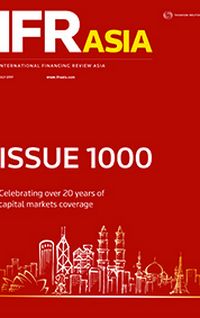IFR Asia asked market participants to predict what might happen in the next 20 years. We quickly found that nobody was brave enough to put their hopes and fears on record, so we did it ourselves. We stand by our predictions 100%, as long as they come true. If not, then they were all just a bit of a laugh.
2018
- Business as usual. Chinese outflows continue to dominate every aspect of Asian capital markets.
- US rates rise slightly, but yield curve flattens after US President Trump’s reforms fail to clear Congress.
2019
- Chinese investment stalls as growth slows to a touch over 5%, sending mainland property prices lower and rocking global markets.
- The Bank of Japan experiments with bond issues where not only do investors receive a negative interest rate, but they also have to hand over to the BoJ any other bonds they have in their portfolio.
- India emerges as the darling of the global markets after more pro-business reforms. Narendra Modi wins a second term as Prime Minister, sending the Sensex to record highs.
- Brexit negotiations, having gone nowhere, are extended by another 12 months.
- US President Donald Trump, in need of a win, bombs North Korea but fails to capture Kim Jong-un.
2020
- Property prices fall in Hong Kong, Australia and Canada as Chinese buyers retreat, prompting mass downgrades in the banking sector.
- First Asian bank automates debt and equity syndicate with an algorithm that decides primary allocations.
- Britain agrees painful Brexit deal. HSBC announces another review on moving its headquarters to Hong Kong.
- After a popular Olympics, Japanese GDP growth exceeds 3%.
- Trump is finally impeached by members of his own party to prevent him running for a second term. In the November election, Joe Biden defeats Mike Pence, Kanye West and Michael Bloomberg to become US President.
2021
- China relaxes foreign ownership restrictions for banks and securities firms, bolstering mainland markets. Shanghai Stock Exchange allows foreign listings.
- India bolsters its position on the capital markets map with its first international sovereign bond. It’s also a Green bond, naturally.
- Democrats reverse Trump’s tax and immigration policies, rejoin Paris climate agreement. Oil and coal prices plunge.
- HSBC moves its headquarters to Hong Kong
2022
- Asian growth rebounds, drawing more investors into local capital markets. Strengthening renminbi sucks overseas Chinese funds back onshore.
- SGX welcomes its first listing of dual-class shares.
- China market liberalisation allows bond roadshows to be held on Facebook Live and Periscope.
- Italian bank collapses, rocking confidence in the euro. EU proposes fiscal reforms that effectively split the bloc into two.
- Korean reunification is completed, boosting construction and consumer stocks in the south, but triggering an argument on who is responsible for North Korea’s defaulted loans from the 1980s.
2023
- China’s central bank launches Asia’s first official digital currency, sending the price of Bitcoin plunging.
2024
- Chinese tech company lists shares in new digital currency, in a deal over 8,000 times subscribed.
- Biden wins a second term as US President, narrowly defeating a reunited Republican party behind Paul Ryan.
2025
- Singapore introduces self-driving taxis, adding 0.5% to GDP through efficiency gains.
2026
- Vietnam becomes first Asian country to scrap all banknotes in favour of a digital currency; social media goes nuts with dong puns.
2027
- Hong Kong banks limit mortgages to less than 20 years, in line with end of the “one country, two systems” framework in 2047. Falling house prices and continued mainland investment trigger street protests.
- HSBC splits its headquarters between Hong Kong and Shenzhen under a new strategy dubbed “one bank, two offices”
- Alibaba opens its own investment bank, where staff have an average age of 27.
2028
- Li Ka-Shing turns 100, says he is still considering retirement.
- George Clooney defeats Kelsey Grammer to become US President.
2029
- Singapore revitalises its high-yield bond market by selling notes in the form of scratch cards.
- President Clooney endorses plan for world’s first fleet of flying cars
2030
- China agrees to extend Hong Kong’s special autonomy for a further 50 years, sending property prices and Hong Kong stocks soaring.
- HSBC moves its headquarters back to Hong Kong.
2031
- Hong Kong prices world’s first REIT based on a single car parking space.
- Malaysian issuers maximise tax benefits by reclassifying coupon and principal repayments as “charitable donations”.
2032
- Indonesian high-yield bond issuers decide to save time in restructurings by not giving offshore investors their bonds in the first place.
2033
- Hackers crack China’s digital currency, falsifying about Rmb1trn. Faced with massive public outcry, China reintroduces banknotes, triggering chaos as banks race to switch ATMs back on.
2034
- Computer failures and data losses at world’s five biggest banks are labelled an “act of terrorism”, sending financial markets reeling.
- Central banks order an immediate halt to all electronic trading to prevent a meltdown of the financial system.
2035
- Global financial regulation, known as Basel XII, is extended to include fintech companies
2036
- Australian economists predict the country will slip into recession at some point in the 22nd century.
2037
- Papua New Guinea is still working on its debut sovereign bond.
- IFR finally suspends print publication, goes digital.


